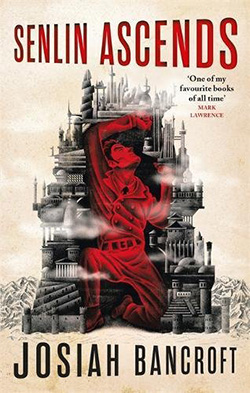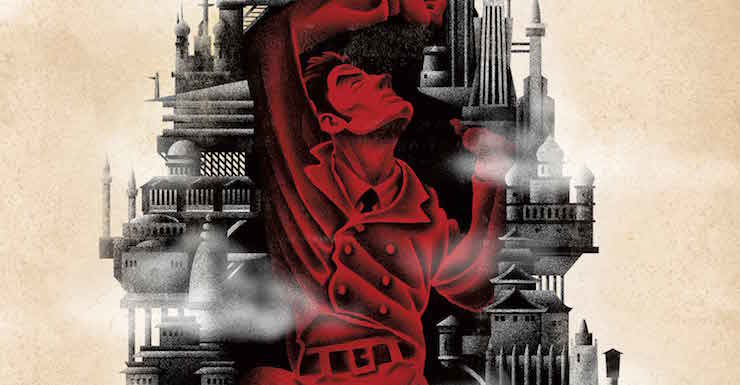Self-published several years ago to next to no notice, Senlin Ascends has a second chance to enrapture readers by way of its wide release this week—and enrapture them it surely shall. If you liked The Lies of Locke Lamora by Scott Lynch, consider this your ticket to some equally fine times.
Incredibly creative in its conception and no less confident in its crafting, Josiah Bancroft’s dazzling debut concerns a couple on a honeymoon that goes to hell in a handcart when their destination of choice disappoints. This pair, though, haven’t popped off to romantic Paris or plotted some vibrant adventure in Venice: rather, they’ve travelled to the Tower of Babel, a monolithic column in the middle of Ur said to be a “great refuge of learning, the very seat of civilisation” and the source of any number of wonders.
That’s what Thomas Senlin has taught his students over the years, at least—and his wonderful new wife, the musically-minded and marvellously imaginative Marya, was one of them, once. But what she and he believe is tested from the second they step off the train into a chaotic marketplace where they’re promptly robbed of their belongings before being separated for the remainder of this terrifically turbulent tale.
Buy the Book


Senlin Ascends (The Books of Babel)
The author has promised to account for Marya’s experiences in a subsequent volume of The Books of Babel, but for now, so far as Senlin and we can see, she’s nowhere; she was right there in the square wearing her distinctive red helmet one moment, and gone the next. Senlin’s search of the dangerous area around the Tower’s base shows no sign of her, sadly, and as the hours turn into days, and the days start stacking up in a similarly scary way, he decides to travel to the Baths in the hopes that his wife simply went on ahead.
A luxury resort of sorts, full of pools and pricey pampering places, it’s here that they’d hoped to drink and dream away their holiday. Unlike most of this particular ringdom’s visitors, however, who fly directly to the entrance on the third level, Senlin—a pauper by comparison to such prosperous pilgrims—will have to traverse the Tower’s grimy ground floors first. That means he’ll have to brave the Basement, where all manner of seedy deeds are done, and then pass safely, somehow, through the Parlour, where the play’s the thing, ring-a-ding-ding!
“The levels of the Tower are called ringdoms because they are like little round kingdoms,” by the by. “They’re like the thirty-six states of Ur, each unique in their way, but instead of being spread out across the map, the ringdoms are stacked up like a birthday cake,” and like the layers of a cake, the stability of each ringdom depends on the support provided by those below.
The interconnectedness of Senlin Ascends’ dizzyingly diverse spread of settings goes beyond just that, in fact. For instance: fountains of cheap beer in the Basement incentivise impoverished passers-by to provide the kinetic energy necessary to pump the superheated air created by actors asked to stoke fires in the Parlour to the Baths where it’s used, among other things, to warm the waters enjoyed by the tourists in that lavish trap. Not only is all this very clever, it also lends a sense of convergence to a novel that otherwise appears awfully episodic.
Of course, appearances can be deeply deceiving, and the impressive gathering together of loose ends in the massively satisfying last act of Senlin Ascends proves out that principle. Characters encountered in passing in the first section are shown to have hidden roles in the whole; elements of the text’s tremendous setting thought throwaway are revealed to be key; and the consequences of Senlin’s increasingly desperate efforts to find a lead on Marya finally catch up with our central character, making his “whole tangled ordeal [sound] simple and tidy in summary.”
Make no mistake, though: as a story, Senlin Ascends is somewhat slow. The larger narrative only really gets its hooks in a little past the halfway mark. Thankfully, the world Bancroft has built beguiles right off the bat—and it’s worth noting that “the Tower was not all terror and confusion. There were wonders here”—whilst the dramatic development of Senlin himself is sure to ensure the attention of even the neediest readers.
At the offing, he’s pretty much a provincial ponce. With a sanctimonious shake of his headmaster’s hat he dismisses even the decent people he meets. But as he ascends the Tower, moving further and “further from familiar things,” his crass convictions crumble. He realises he must look to others if he’s to have any hope of living a quiet life with his wife, and this revelation changes him. Happily, he doesn’t suddenly become a hero—nothing in Senlin Ascends is so on the nose—but he does begin to recognise how unhelpful his behaviour has been:
All his old virtues had become failings. His calm, his patience, his love of deliberation, his rationalism and fair-mindedness: all were now flaws. He needed to be cocksure and shrewd. But even then, how could a cocky bookworm compete?
How indeed.
You’d be forgiven for missing Senlin Ascends on its first outing, but don’t dare make the same mistake a second time. It’s sweet, smart and sharply imagined, with a sublime setting and a surprisingly sympathetic character at its centre. Like Senlin’s search, it falters in the beginning, but before long finds focus and, with it, a mass of momentum that positively propels readers towards a destination as devious as it is devastating. Thanks to the industry’s belated interest in The Books of Babel, the next instalment of said series, Arm of the Sphinx, may only be a couple of months away from publication, but Senlin Ascends is so engrossing that you’ll want—nay need—to read it immediately.
Originally self-published in 2013, Senlin Ascends is now available from Orbit. Its sequel, Arm of the Sphinx arrives in paperback this March.
Niall Alexander is an extra-curricular English teacher who reads and writes about all things weird and wonderful for The Speculative Scotsman, Strange Horizons, and Tor.com. He lives with about a bazillion books, his better half and a certain sleekit wee beastie in the central belt of bonnie Scotland.










